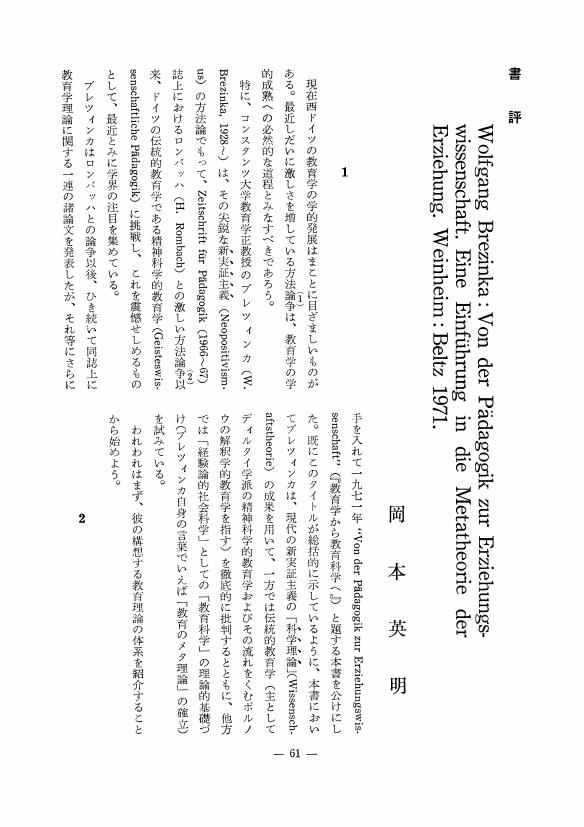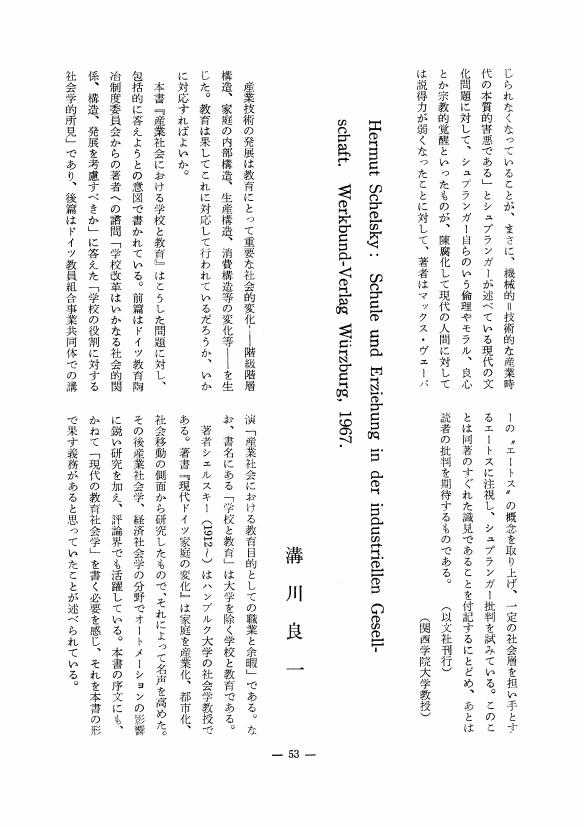- 著者
- 伊藤 幸寿
- 出版者
- The Japanese Society for the Philosophy of Education
- 雑誌
- 教育哲学研究 (ISSN:03873153)
- 巻号頁・発行日
- vol.1975, no.32, pp.66-71, 1975-10-10 (Released:2009-09-04)
- 著者
- 大木 秀夫
- 出版者
- The Japanese Society for the Philosophy of Education
- 雑誌
- 教育哲学研究 (ISSN:03873153)
- 巻号頁・発行日
- vol.1975, no.31, pp.74-79, 1975-05-20 (Released:2009-09-04)
- 著者
- 岡本 英明
- 出版者
- The Japanese Society for the Philosophy of Education
- 雑誌
- 教育哲学研究 (ISSN:03873153)
- 巻号頁・発行日
- vol.1974, no.29, pp.61-67, 1974-05-15 (Released:2010-05-07)
- 参考文献数
- 17
- 著者
- 斎藤 勉
- 出版者
- The Japanese Society for the Philosophy of Education
- 雑誌
- 教育哲学研究 (ISSN:03873153)
- 巻号頁・発行日
- vol.1974, no.29, pp.68-72, 1974-05-15 (Released:2009-09-04)
- 著者
- 溝川 良一
- 出版者
- The Japanese Society for the Philosophy of Education
- 雑誌
- 教育哲学研究 (ISSN:03873153)
- 巻号頁・発行日
- vol.1973, no.28, pp.53-56, 1973-11-15 (Released:2009-09-04)
- 著者
- 村田 昇
- 出版者
- The Japanese Society for the Philosophy of Education
- 雑誌
- 教育哲学研究 (ISSN:03873153)
- 巻号頁・発行日
- vol.1972, no.26, pp.64-67, 1972 (Released:2009-09-04)
- 著者
- 広島大学大学院生
- 出版者
- The Japanese Society for the Philosophy of Education
- 雑誌
- 教育哲学研究 (ISSN:03873153)
- 巻号頁・発行日
- vol.1972, no.25, pp.72-75, 1972-05-20 (Released:2009-09-04)
1 0 0 0 ルソーにおける利己的情念と「人間の本源的善性」論
- 著者
- 坂倉 裕治
- 出版者
- The Japanese Society for the Philosophy of Education
- 雑誌
- 教育哲学研究 (ISSN:03873153)
- 巻号頁・発行日
- no.73, pp.51-64, 1996
Cet article se propose de réduire le décalage entre les recherches spécialisées et l'image commune concernant la pensée pédagogique de J. -J. Rousseau. On dit souvent que Rousseau, confiant en "la bonnté originelle" de l'enfant, se fait l'apôtre d'une "éducation négative", qui exclut les pressions et les directive par les adultes. D'autre part, des spécialistes insistent sur le fait que la volonté de l'élève est sous l'emprise du gouverneur omnipuissant dans l'<I>Emile</I>. Nous pensons que cette lecture commune surestime l'argument de "la bonté originelle". Pour démontrer cet argument, Rousseau distingue "l'amour de soi" absolument bon et naturel d'avec "l'amour-propre", forme modifiée ou dépravée du premier. On interprète souvent "l'amour de soi" comme le principe de toute léducation d'Emile. Il faut remarquer cependant que "l'amour-propre" peut être investi de valeurs positives chez Rousseau. En ôtant toutes les relations artificielles acquise dans la société pour introduire "l'amour-de soi" comme une forme spéciale de "l'amour-propre", Rousseau critique les jus-naturealistes modernes qui approuvent les passions interéssées et les théologiens qui nient l'amour-propre par l'invocation du péché originel; les uns et les autres coucluent, par une route opposée, que la société telle qu'elle est est nécessaire, soit pour satisfaire les désirs humains, soit pour maintenir l'ordre social. Cette critique qui se fonde sur "la bonté originelle", n'est qu'un <I>préparatif</I> pour "la vraie éducation" qui envisage de faire former uc nouveau par l'élève des relations convenables avec les autres êtres selon le développement de ses facultés.
- 著者
- 中井 孝章
- 出版者
- The Japanese Society for the Philosophy of Education
- 雑誌
- 教育哲学研究 (ISSN:03873153)
- 巻号頁・発行日
- no.63, pp.80-93, 1991
This paper grapples with the problem of how two contradictory trends, i.e. sound education and training by 'correct' listening through the school subject of music on the one hand, and the training of bodily and time-sense discipline through noise such as chimes on the other hand, can exist side by side; it is attempted to develop a reform of the repression of body feeling resulting from this problem by searching for a feature sound scenery of the child and its systematization through environmental music.<BR>Looking at it from the angle of listening, the way of listening as music appreciation ressembling the setting of a concert hall, is repressive as it is limited to the activation of only some particular organ (hearing) of the body whereas a sound scenery created by music performed by children in a life-like setting, symbolized as 'the mystery of sound' creates every time with acuteness in the body sensation a feature of sound. The systematic grasp of the feature world of sound admitting unlimited possibilities for change, constitutes environmental music and forms the prototype of music. It turns the listener to exploratory listening by its characteristic feature of forming non-dailiness (the effect of 'dissimilation') enabling him to re-appraise anew radically the accustomed life environment. Constructing 'sound education' based on environmental music also in music practice, and revealing contradictory sound education and training is being demanded.
1 0 0 0 笑うキルケゴールのニヒリズム:コーヒーと散歩と実存とわたし
- 著者
- 山内 清郎
- 出版者
- The Japanese Society for the Philosophy of Education
- 雑誌
- 教育哲学研究 (ISSN:03873153)
- 巻号頁・発行日
- no.94, pp.91-97, 2006
- 著者
- 山内 清郎
- 出版者
- The Japanese Society for the Philosophy of Education
- 雑誌
- 教育哲学研究 (ISSN:03873153)
- 巻号頁・発行日
- no.90, pp.1-19, 2004
This paper explores an aspect of Søren Kierkegaard as a humoristic awakening teacher. In the theory of education, Kierkegaard has been well known as an existential thinker. The concepts of 'awakening' and 'subjective decision' are considered to be unique to Kierkegaard. A good deal of effort has been made to clarify the relation of educational theory and existential philosophy, a topic which is not ours here. Our concern is with the examination of the performative role that Kierkegaard intends to play in front of his audience.<BR>Kierkegaard describes himself as a humorist in his <I>Concluding Unscientific Postscript to Philosophical Fragments</I>, whose author is Johannes Climacus (one of Kierkegaard's pseudonyms). The question here is if we have not often overlooked the fact that the text is written by a humorist. Have we paid due attention to the nuances and atmospheres of the narrative of Climacus? <BR>To begin with, we have to inquire into the meaning of "misunderstanding" which Kierkegaard thinks as one of his main themes all through his authorship. A great deal of misunderstanding in his age has made it necessary for Kierkegaard to adopt pseudonymous authorship and to communicate in an experimental form of a humorist.<BR>Then, a detailed analysis of Climacus' humoristic narrative illustrates four features of a humorist : (1) continually to join the conception of God together with something else and to bring out contradictions; (2) not to relate himself to God in religious passion; (3) to change himself into a jesting and yet profound transition area for all the transactions; (4) to renounce the concordance of joys that go with having an opinion and always to dance lightly.<BR>Lastly, it seems reasonable to suppose that Climacus' usage of "existence" is far from that of a conventional context of existential philosophy. This view on humoristic style of Climacus' narrative should throw new light on the relation between educational theory and Kierkegaard.
1 0 0 0 トマス・アクィナスにおける「知識の獲得」の構造
- 著者
- 三上 茂
- 出版者
- The Japanese Society for the Philosophy of Education
- 雑誌
- 教育哲学研究 (ISSN:03873153)
- 巻号頁・発行日
- no.15, pp.19-33, 1967
The purpose of this paper is to expound Thomas Aquinas's theory of 'the acquisition of knowledge' (<I>acquisitio scientiae</I>), paying particular attention to his treatise on a teacher, <I>De Magistro</I>.<BR>Thomas gives two things as the prerequisites for the acquisition of knowledg -'the light of active intellect' (<I>lumen intellectus agentis</I>) and 'principles' (<I>principia</I>)- and discusses them in relation to the 'pre-existing knowledge' (<I>scientia prae-existens</I>). But this <I>pre</I>-existence is not to be regarded as suggesting precedencei n time; rather, we should interpret it in logical terms.<BR>On the other hand, Thomas maintains that the acquisition of knowledge is made by two means, that is, 'discovery' (<I>inventio</I>) and 'learning through training' (<I>disciplina</I>). This implies that teachers and students belong to a same order in a sense, while in the other sense they are at different stages. By making this point clear, Thomas definitely gives a teacher his proper place in his relationship to the students as well as to the process of the acquisition of knowledge.
1 0 0 0 J・S・ミルの感情教育論
- 著者
- 田口 仁久
- 出版者
- The Japanese Society for the Philosophy of Education
- 雑誌
- 教育哲学研究 (ISSN:03873153)
- 巻号頁・発行日
- no.25, pp.35-49, 1972
J. S. Mill, one of the representative English thinkers, is at the same time an important figure in the history of education. His ethical philosophy was formulated after a spiritual crisis. The system was based on the idea that theatimate sanction of morality consists in the sentiment of man, especially in his altruistic social sentiments, as a result of this theory and of his understanding of English society, Mill was forced eventually to attach great importance to the cultivation of sentiments.<BR>Furthermore, Mill believed that social sentiments pan be nourished through the medium of the imagination. While regarding art education in general and culture of the sentiments as an effective means to that end, he valued poetry as the "better part" or as the "queen", and thus he regarded poetry education as the most effective means for the cultivation of the sentiments.
1 0 0 0 J・S・ミルにおける功利主義と教育思想の関係
- 著者
- 高宮 正貴
- 出版者
- The Japanese Society for the Philosophy of Education
- 雑誌
- 教育哲学研究 (ISSN:03873153)
- 巻号頁・発行日
- no.95, pp.51-70, 2007
The purpose of this paper is to clarify the relationship between J. S. Mill's utilitarianism and his educational thought. For Mill, utilitarianism must ground educational thought so long as it shows the purpose of human life.<BR>The following points will be discussed in this paper.<BR>1. The feature of Mill's utilitarianism is to introduce not only the first principle, "the Greatest happiness principle, " but also "secondary principles" such as liberty and virtue. Each "secondary principle" has its own priority unless it conflicts with each other. Education and instruction are regarded as "secondary principles" as they enable people to learn the tendencies of actions. Education restricts the application of "the principle of liberty, " which is one of the "secondary principles." "The principle of liberty" affirms the liberty of "self-regarding" action, but nonage and children, who cannot act rationally, are not qualified to be endowed with this liberty.<BR>2. According to Mill, utilitarianism requires moral education for its realization and justification. This moral education must be conducted by developing one's own individuality. The purpose of this moral education can be accomplished not only by providing systematic education, but also by using the forces of social institutions, public opinions, and religion.
1 0 0 0 矢野智司著『自己変容という物語-生成・贈与・教育-』
- 著者
- 広石 英記
- 出版者
- The Japanese Society for the Philosophy of Education
- 雑誌
- 教育哲学研究 (ISSN:03873153)
- 巻号頁・発行日
- no.83, pp.97-105, 2001
- 著者
- 佐藤 隆之
- 出版者
- The Japanese Society for the Philosophy of Education
- 雑誌
- 教育哲学研究 (ISSN:03873153)
- 巻号頁・発行日
- no.83, pp.106-113, 2001






